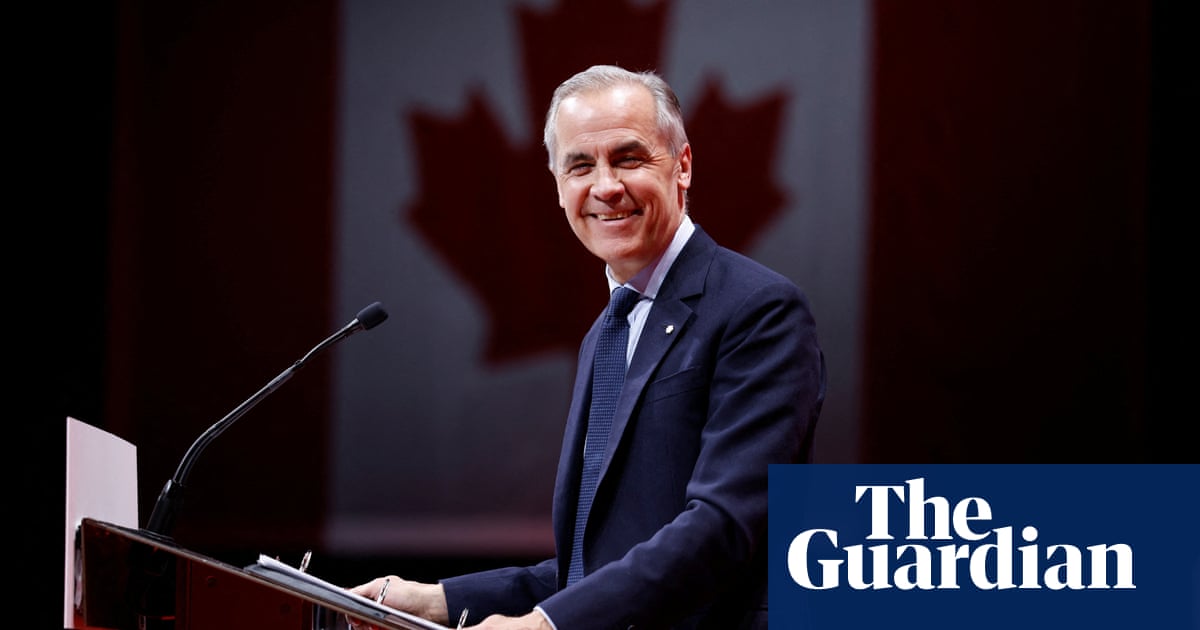In his victory speech early on Tuesday,Mark Carneywasted little time calling for a dramatic reshaping of his government’s relationship with the United States, arguing that threats fromDonald Trumpcast doubtCanada’s ability to function as a “free, sovereign, and ambitious” nation.
The former central banker and investment executive had for months focused his electoral campaign on the threats from Canada’s largest trading partner and longtime political ally.
Carney, a self-professed lover of policy mechanics, has pledged to redevelop Canada’s economy to reduce its reliance on the US – a daunting task, given that bilateral trade contributes to a fifth of Canada’s gross domestic product.
And in what should have been a celebratory address, he took on a somber tone as he considered the end of the affair.
“Our old relationship with the United States, a relationship based on steadily increasing integration, is over. The system of open global trade anchored by the United States – a system that Canada has relied on since the second world war, a system that while not perfect has helped deliver prosperity for a country for decades – is over,” he said.
He also called for national unity, cognizant of the geographic and political frictions that had until recently, suggested Canadians would elect a Conservative government.
“My message to every Canadian is this: no matter where you live, no matter what language you speak, no matter how you voted, I will always do my best to represent everyone who calls Canada home,” Carney said.
Along with external pressure from Trump, Canada still faces a raft of unresolved internal tensions: a housing shortage, amplified by high immigration levels and the spiralling cost of living, has left voters increasingly frustrated and distrustful of the Liberal party. Carney has pledged to use the power of government to combat the interlocking crises, telling supporters on Tuesday morning that his ministers could “do things previously thought impossible at speeds we haven’t seen in generations”.
“The point is is that we can give ourselves far more than the Americans can ever take away.
The prime minister expects to have a call with Trump in the coming days, a senior Liberal said, and will begin negotiations on a new trade agreement.
“He is treating his upcoming meeting like he did debate prep during the election: preparing for all possible scenarios,” the source said. “Because he doesn’t know which version of the president he might get.”
There is little doubt Canada is at both an economic and political crossroads and Carney must navigate competing visions for the country’s future trajectory.
“The big question is how much Canadian federal government wants to pursue closer relations with the United States,” said Peter Morrow, an associate professor of economics at the University of Toronto. “The challenge for Canada is that it’s not really is not in a good position to diversify away too much from its economic relationship with United States. Geography just makes it an obvious trading partner. And if you diversify too much, then it’s almost like you’re trying to pull a Brexit.”
But Morrow says Canadian officials face a challenge in revisiting a trade agreement previously negotiated with Trump in his first term. “What sorts of concessions do you make in an agreement with a partner who’s shown that they’re willing to throw those agreements out the window?”
In recent weeks, Canadians have engaged in economic nationalism,boycotting American goods and encouraging fellow citizens to seek out domestic options to supplant imports.
“Everything we know is that companies that engage in global transactions tend to be more productive than companies that don’t. This nationalist turn inward for Canada is really not a good idea,” said Morrow. “What Canada should be doing is trying to buy from Europe, engage with a wider array of trading partners and resisting the temptations of economic nationalism.”
Morrow points to recent discussions in Canada on whether to continue with the purchase of American-made F-35 fighter jets, knowing that the US might be an “unreliable partner” in the future. Critics of the multibillion-dollar deal with Lockheed Martin have suggested that Canada instead examine offers from European defense manufacturers.
In his election night speech, Carney hinted at a goal of strengthening relations with like-minded allies in Europe. The technocratic Liberal leader, who previously served as governor of both the Bank of Canada and the Bank of England, has been eager to burnish his global credentials.
In his brief, nine-day tenure as prime minister before calling a snap election, he met the French president, Emmanuel Macron, and UK prime minister, Keir Starmer. Carney’s defensive positioning of Canada’s economy and political alliances will be on display in June, when he hosts leaders from G7 countries in the province of Alberta.
Juliette Théorêt, a University of Ottawa student of defence policy who attended Carney’s victory party, said the prime minister won her vote by pitching a vision of the country that involved less reliance on its longtime ally.
“Before Trump, I don’t think national security and national sovereignty were big topics of conversation. And without him, there’s a good chance the election would have swayed in a different direction,” she said. “But threats of [making Canada the] 51st state, and this idea of not having a border between Canada and the US – that really pushed people to unite.”
